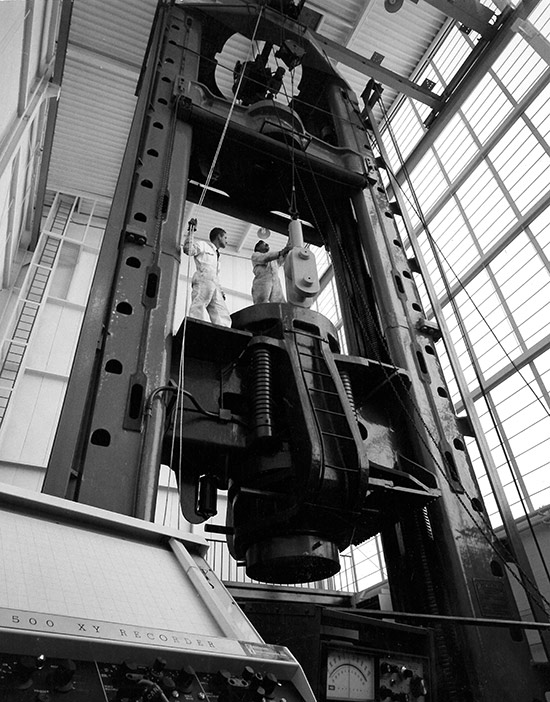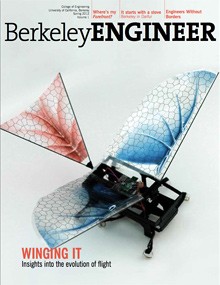New tenants at Richmond Field Station
 Richmond Field Station in 1966. (Contemporary print from original negative by Ansel Adams, UCR/California Museum of Photography, Sweeney/Rubin Ansel Adams FIAT LUX Collection, University of California, Riverside)After World War II, when veterans started returning to campus on the G.I. Bill, UC Berkeley grew dramatically. The Regents told the College of Engineering it was time to move some of its flumes, fluids ponds and heavy equipment—like the four-million-pound testing machine pictured (left)—to make room for academic programs.
Richmond Field Station in 1966. (Contemporary print from original negative by Ansel Adams, UCR/California Museum of Photography, Sweeney/Rubin Ansel Adams FIAT LUX Collection, University of California, Riverside)After World War II, when veterans started returning to campus on the G.I. Bill, UC Berkeley grew dramatically. The Regents told the College of Engineering it was time to move some of its flumes, fluids ponds and heavy equipment—like the four-million-pound testing machine pictured (left)—to make room for academic programs.
This prompted Dean Murrough O’Brien to find a site where Berkeley engineers could spread out and build big things. In 1950, the university purchased 170 acres of bayside land about six miles northwest of campus from a dynamite manufacturer. The new location became known as the Richmond Field Station (RFS).
For the past 60 years, research at the RFS was “very important to California, the United States and the rest of the world,” says Professor Emeritus Carl Monismith, a civil engineer with the Institute of Transportation Studies and one of RFS’s first occupants. In utilitarian buildings, identified only by numbers, engineers have studied everything from the durability of pavement to cars guided by magnets; used giant hydraulic equipment to test the efficacy of water-cooled power plants and the structural integrity of dam and bridge designs; and simulated earthquakes with one of the biggest shake tables in the country.
Now large-scale engineering projects will share space with the Lawrence Berkeley National Laboratory (LBNL). Like the university decades before, the lab is outgrowing its space in the Berkeley hills. In January, LBNL announced that the RFS is its top choice as a second campus. Pending environmental and other regulatory reviews, LBNL hopes to open new research space by 2016. The first tenants will be the lab’s bioscience projects, which are currently spread out around the Bay Area.
Future construction phases could add space for as many as 1,000 more researchers and employees. The university will continue to use about a third of the reconfigured space. If the new arrangement is anything like the existing relationship between the college and LBNL, RFS will be the home of a new generation of collaboration and innovation.
